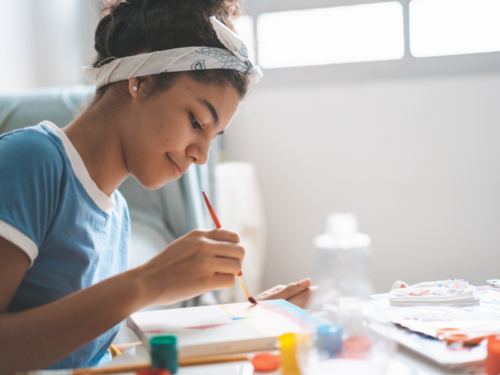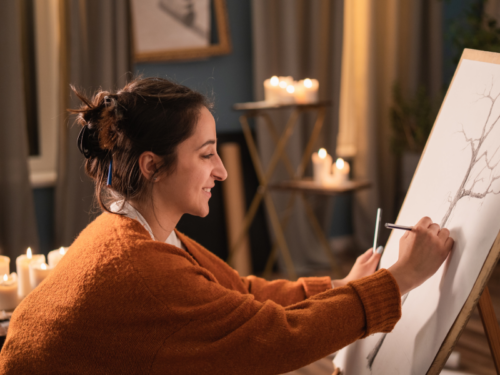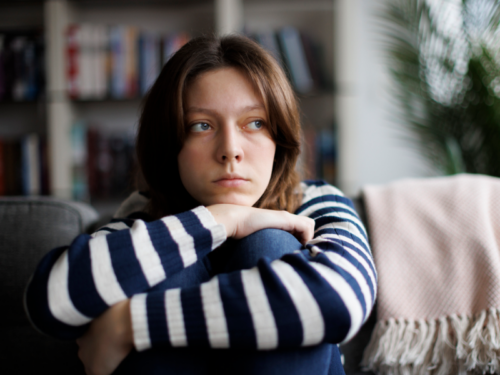Art & music therapy
It’s not always easy to express your thoughts, emotions, and mental health struggles. That’s why some people benefit from therapeutic approaches that promote healing through non-verbal practices like drawing, finger painting, and song.
How is our approach to art & music therapy different?
Personalized artistic exercises
Non-verbal group participation
Virtual options
Holistic treatment
Inclusive approach
Benefits of art & music therapy
Self-discovery
Allows people to explore their identity and emotions through artistic mediums
Non-verbal healing
A creative outlet for those who find it difficult to articulate their feelings
Stress reduction
Engaging in calming, creative activities helps alleviate stress and anxiety
From the Library
Join the Charlie Health Library
Get mental health updates, research, insights, and resources directly to your inbox.
You can unsubscribe anytime.
What can art & music therapy help with?
Art therapy is a technique that uses artistic methods to improve a person’s mental, physical, and emotional wellbeing. People have been using art to express themselves for centuries, but it was first documented as a therapeutic tool to promote healing in the 1940s.
Anxiety disorders
Art & music therapy provides a creative outlet for expressing feelings of anxiety, helping people visualize and process their worries in a safe and supportive environment.
Depression
This therapy encourages people to explore and express their emotions creatively, promoting emotional release that can alleviate feelings of sadness and hopelessness.
Post-traumatic stress disorder (PTSD)
Art & music therapy allows clients to express traumatic experiences through creative means, facilitating healing and processing without the need for verbal recounting of distressing memories.
ADHD (attention-deficit/hyperactivity disorder)
Engaging in artistic activities helps improve focus and self-regulation, providing a structured and stimulating way to channel energy and attention while developing coping strategies.
FAQs about art & music therapy
See All FAQsWhat is art therapy?
Art therapy is a technique that uses artistic methods to improve a person’s mental, physical, and emotional wellbeing. People have been using art to express themselves for centuries, but it was first documented as a therapeutic tool to promote healing in the 1940s.
The goal of art therapy is to encourage people to open up and engage with their therapist in a less conventional way. By using art as a form of expression, some people may feel more comfortable exploring emotions, managing behaviors, and reconciling conflicts—all of which can reduce stress and boost self-esteem.
Today, art therapy comes in many forms. Some of the most common types are:
- Collaging
- Coloring
- Doodling
- Drawing
- Finger painting
- Painting
- Photography
- Pottery
- Sculpting
What is music therapy?
Music therapy is an evidence-based form of treatment that uses music interventions to help people accomplish their therapy goals. Performed by certified therapists, music therapy was designed to address a range of mental, physical, cognitive, and social issues that can impact a person’s mental health.
Music therapy might look a little different for each person, but it usually involves some combination of active and receptive techniques. Active music therapy is when a person is actually creating music—this could be composing, singing, chanting, or playing an instrument. Receptive techniques tend to focus on listening or responding to music, such as a discussion about the lyrics to a song or dancing to a beat.
Who should try art and music therapy?
Before you write off art or music therapy as being too childish or outside of your comfort zone, remember that it’s an effective tool for people of all ages and artistic abilities. Artistic forms of therapy are especially helpful for individuals who feel out of touch with their emotions or have difficulty discussing their feelings.
Art and music therapies are used to treat a wide variety of mental health symptoms and psychological disorders, including:
Can I do art or music therapy on my own?
Just like other forms of therapy, art or music therapy must be facilitated by a qualified professional in an appropriate setting. Typically, this means a master-level clinician who is trained in psychotherapy and a specific discipline. Therapy sessions occur in a medical or rehabilitation facility, private practice, or mental health clinic—and it’s even possible to participate from home when the treatment is part of a virtual intensive outpatient program.
It’s also important to note the difference between official art therapy and creative hobbies, such as adult coloring books. Although coloring books have grown in popularity for good reason, they don’t allow for the same level of introspection and evaluation as art therapy conducted with a therapist. In fact, it’s truly the combination of making the art and reflecting with a therapist that leads to the greatest benefits and breakthroughs.








